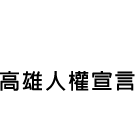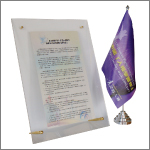|
 |
  Kaohsiung Declaration of Human Rights Kaohsiung Declaration of Human Rights  |
 |
| |
 加入國際計畫,打造人權城市-高雄市2008年國際人權日宣言 加入國際計畫,打造人權城市-高雄市2008年國際人權日宣言
 今天是聯合國通過《世界人權宣言》的六十周年,也是為了紀念《宣言》而為全球各國共同訂定的國際人權日。今天同時也是聯合國「人權學習年」的起跑日。雖然重新加入聯合國的努力尚未成功,台灣仍然是人權地球村不可分割的一部份;美麗島事件發生地的咱高雄市,自然更與普世人權血脈相連,不能自外於人類落實普世人權的共同奮鬥。 今天是聯合國通過《世界人權宣言》的六十周年,也是為了紀念《宣言》而為全球各國共同訂定的國際人權日。今天同時也是聯合國「人權學習年」的起跑日。雖然重新加入聯合國的努力尚未成功,台灣仍然是人權地球村不可分割的一部份;美麗島事件發生地的咱高雄市,自然更與普世人權血脈相連,不能自外於人類落實普世人權的共同奮鬥。
二戰結束以來,由於人權規範與機制的國際化,普世人權的理念散播全球;但人權意識的深化與相關知識的傳播仍然不足,深刻影響普世人權的具體落實。因此,繼1994年開始的「人權教育十年」後,聯合國又根據大會62/171號決議,啟動今天開始的「人權學習年」,期待產生更深入恆久的效果。因此「人權學習年」將以透過增進市民的人權知識,培養市民行使與促進人權的能力,亦即以為市民「培力」(empowerment)為目標。在此一目標下,各國各地無疑將有不同的取徑。各種模式中最積極先進者,莫過於聯合國所大力推薦的「人權城市計畫」。
人權城市計畫是國際人權組織「人權教育人民運動」(PDHRE)所發起的一個相當獨特的全球運動。該組織的創立者Shulamith Koenig女士並因此一及其他成就,獲頒2003年的聯合國人權獎。1997年以來,各大洲都出現了「人權城市」(Human Rights Cities),包括奧國的克拉茲市、加拿大的愛蒙頓市和美國的華盛頓。而咱高雄市也不落人後,在2005年於Koenig女士率團訪台後,也加入人權城市計畫。
人權城市各有其獨特的社會、經濟、歷史與文化背景,因此落實模式不盡相同,但重點皆為:透過公民社會組織與市政府的共同努力,以達成:
一、培養人權為市民所有而非他人恩賜的意識,將此意識與日常生活化為一體,並透過實踐與行動,促進所有 人權(公民、政治、經濟、社會與文化人權)在該城市的落實。 人權(公民、政治、經濟、社會與文化人權)在該城市的落實。
二、促使民主政治成為兌現各種人權的治理機制,並以弱勢社群的人權培力為優先目標。
三、增進市民個人與公民社會組織的能力與能量,以普世人權的架構為指引,實踐該城市的永續發展、和平 、安全與社會正義。 、安全與社會正義。
四、使該城市成為國內、區域與國際其他城市的典範與指標。
在慶祝國際人權日以及《世界人權宣言》六十周年的今日,這也應該是咱們高雄市的願景:將人權學習與公民的社會行動,以及將人權實踐與城市的民主治理,結合起來。咱高雄市將採取下列措施,進一步落實人權城市的願景:
一、市政府將成立「高雄市人權委員會」以規劃推展高雄市人權事務。
二、由市政府提供空間與設備,設立「高雄市公民社會組織會館」,協助人權團體的發展成長與分工合作。
三、持續與PDHRE合作,為公民社會組織與市政府舉辦比2005年對象更為廣泛的人權城市訓練營,並為人權 城市計畫籌備處的設立提供諮詢。 城市計畫籌備處的設立提供諮詢。
四、透過國內與國際合作,成立正式組織,訂定計畫步驟,展開打造咱高雄市為人權城市的工作。
諸位高雄市的市民,美麗島事件發生地的高雄市曾經為台灣的民主化與人權進展發揮過歷史性的關鍵角色。這是一個值得珍惜紀念的遺產。以今天這個光輝的國際人權日為起點,更進一步,把我們高雄市打造成一個光輝的人權城市,應該是一個值得我們追求的願景。讓我們共同努力實踐這個願景,使咱高雄市和所有的先進人權城市一起,成為我國、亞洲和世界其他城市的指標。 |
| |
 Building a Human Rights City─ Building a Human Rights City─
 Declaration of Kaohsiung City on the 2008 Human Rights Day Declaration of Kaohsiung City on the 2008 Human Rights Day
This year marks the sixtieth anniversary of the Universal Declaration of Human Rights. Today, the International Human Rights Day, also marks the beginning of the International Year of Human Rights Learning. Although Taiwan’s aspiration to rejoin the United Nations has borne no fruitful result yet, Taiwan is nevertheless an inseparable part of the global village of human rights. Kaohsiung City especially, with vivid memories of the Formosa Incident, must join in the universal pursuit of human rights.
Since the end of the Second World War, the concept of human rights has been disseminated throughout the world due to the internationalization of norms and mechanisms. However, the deepening and broadening of awareness and education remained insufficient despite the UN Decade for Human Rights Education from 1995 to 2004. The United Nations is therefore launching the International Year of Human Rights Learning today in accordance with UN Resolution 62/171. The goal of the year to come is to enhance people’s awareness and knowledge of human rights, as a way of empowering them. There are various approaches towards achieving this common goal. The most proactive among them would be the Human Rights Cities Program recommended by the United Nations.
The Human Rights Cities Program is a unique global movement initiated by the People’s Movement for Human Rights Education (PDHRE) founded by Ms. Shulamith Koenig, recipient of the 2003 UN Human Rights Award. Human Rights Cities have emerged over the five continents since 1997, including Graz (Austria), Edmonton (Canada), and Washington (US). Kaohsiung City also joined in the program in 2005 after Ms. Koenig’s visit with a delegation..
Each of the Human Rights Cities has its own unique social, economic, historical and cultural backgrounds that lead to different ways of implementing the program. But all of them emphasized the importance of joint efforts by civil society organizations and the city government
A. To instill a sense of ownership of human rights as a way of life, leading to action for the  realization of all human rights, civil, political, economic, social, and cultural, in order to realization of all human rights, civil, political, economic, social, and cultural, in order to  benefit all the inhabitants of a city; benefit all the inhabitants of a city;
B. To promote democracy as a delivery system of human rights, with priority always give  to the empowerment of the most vulnerable; to the empowerment of the most vulnerable;
C. To enhance the capability and capacity of individuals and civil society organizations for  sustainable development, peace, security, and social justice; sustainable development, peace, security, and social justice;
D. To be a beacon of light for other communities all over the world.
On this glorious day, it is only proper and right that the City of Kaohsiung should seek to combine transformative human rights learning and practice with democratic governance, by adopting the following measures.
A. A Human Rights Commission will be appointed, with the mandate of promoting and
 protecting human rights in this city; protecting human rights in this city;
B. The city government will provide space and equipments for the establishment of a
 Kaohsiung House of Civil Society Organizations, to support the development and Kaohsiung House of Civil Society Organizations, to support the development and
 collaboration of human rights organizations; collaboration of human rights organizations;
C. Kaohsiung City will continue the cooperation with PDHRE, by inviting it to provide
 training for more trainees than the 2005 program, and to provide consultation for the training for more trainees than the 2005 program, and to provide consultation for the  establishment of a steering committee of the city’s human rights cities project. establishment of a steering committee of the city’s human rights cities project.
Dear citizens, our City has played a pivotal role in the development of democracy and human rights of Taiwan. This is a legacy that we should all cherish. Today, this very special International Human Rights Day, should be an excellent starting point for us to make our city a glorious human rights city. Let us work together with each other and all the other human rights cities in the world, and, in doing so, make Kaohsiung a beacon of light not only for Taiwan, but also for Asia and the whole world. |
|





 今天是聯合國通過《世界人權宣言》的六十周年,也是為了紀念《宣言》而為全球各國共同訂定的國際人權日。今天同時也是聯合國「人權學習年」的起跑日。雖然重新加入聯合國的努力尚未成功,台灣仍然是人權地球村不可分割的一部份;美麗島事件發生地的咱高雄市,自然更與普世人權血脈相連,不能自外於人類落實普世人權的共同奮鬥。
今天是聯合國通過《世界人權宣言》的六十周年,也是為了紀念《宣言》而為全球各國共同訂定的國際人權日。今天同時也是聯合國「人權學習年」的起跑日。雖然重新加入聯合國的努力尚未成功,台灣仍然是人權地球村不可分割的一部份;美麗島事件發生地的咱高雄市,自然更與普世人權血脈相連,不能自外於人類落實普世人權的共同奮鬥。